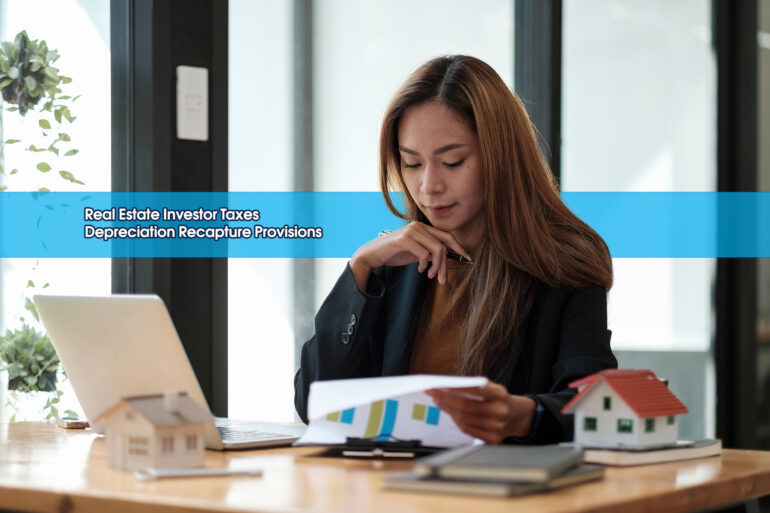Real Estate Investor Taxes: Depreciation Recapture Provisions
As a real estate investor, you are always looking for ways to maximize your returns and minimize your costs. One critical aspect of real estate investing is understanding depreciation recapture provisions. These provisions come into play when you sell a rental property, and they can have a significant impact on your bottom line.
However, with the ideal knowledge and strategies, you can minimize the impact of these provisions and keep more of your hard-earned profits. We’ll provide a comprehensive overview of depreciation recapture provisions and explain why they are necessary resolutions for real estate investors in 2023.
We’ll also offer tips and strategies for reducing tax liability and maximizing your returns. Whether you’re a seasoned investor or just starting, this blog will equip you with the knowledge you need to make informed decisions about your real estate investments.
This higher tax rate is designed to discourage real estate investors from claiming the tax benefits of depreciation while owning a property and earning profit from selling it while evading taxes.
Definition of Depreciation Recapture Provisions
According to Investopedia, depreciation recapture provisions refer to a tax law in the United States that requires real estate investors to pay a portion of the profits they earn from selling a rental property back to the government.
The amount of tax owed is based on the amount of depreciation taken on the property during the time the investor owned it. This tax is known as “depreciation recapture” because it requires the investor to “recapture” the depreciation previously claimed as a tax deduction.
The purpose of depreciation recapture provisions is to prevent investors from using the tax benefits of depreciation to lower their tax bill and then earn a large profit after selling a property without paying taxes on the full profit amount.
What is the Tax Rate for Depreciation Recapture?
The tax rate for depreciation recapture is 25% for most real estate investors. This rate applies to the portion of the profits from the sale of a rental property that is the result of depreciation deductions taken over the time the property was owned.
It’s important to note that there are different tax rates for different types of investment income, and the rate for depreciation recapture is generally higher than the rate for capital gains tax. This higher tax rate is designed to discourage real estate investors from claiming the tax benefits of depreciation while owning a property and earning profit from selling it while evading taxes.
It’s also worth mentioning that some real estate investors may be subject to different tax rates based on their tax situation, including their taxable income and other factors. Therefore, it’s recommended that real estate investors work with a tax professional to understand their specific tax implications.
It’s important to note that depreciation recapture only applies to rental properties and not personal residences.
Calculating Depreciation Recapture
The calculation of depreciation recapture starts by determining the depreciation amount taken on a property over the time it was owned by the investor. This amount is then taxed at a special tax rate, typically higher than the capital gains tax rate.
Formula: Depreciation Recapture = (Amount of Depreciation Taken) x (Depreciation Recapture Tax Rate)
Example 1:
An investor owns a rental property for 10 years and takes $10,000 in depreciation deductions each year for a total of $100,000 in depreciation. When the investor sells the property, they realize a profit of $200,000. The depreciation recapture amount would be calculated as follows:
Depreciation Recapture = ($100,000) x (25%) = $25,000
Example 2:
An investor owns a rental property for seven years and takes $12,500 in depreciation deductions each year for a total of $87,500 in depreciation. When the investor sells the property, they realize a profit of $150,000. The depreciation recapture amount would be calculated as follows:
Depreciation Recapture = ($87,500) x (25%) = $21,875
It’s important to note that the above formula and examples are simplified and may not accurately reflect the full tax implications of depreciation recapture.
This tax can impact the profitability of your investments, potentially reducing the amount of money you can keep from the sale of your rental properties.
What Triggers a Depreciation Recapture?
A depreciation recapture is triggered when a real estate investor sells a rental property that they have taken depreciation deductions on during their ownership of the property. The sale of the property results in a profit, and a portion of this profit is considered to be the result of the depreciation deductions taken in the past. This portion of the profit is subject to the tax known as depreciation recapture.
It’s important to note that depreciation recapture only applies to rental properties and not personal residences. Additionally, other situations may trigger a depreciation recapture, such as exchanging the property for another rental property or transferring the property to a family member.
Impact of Depreciation Recapture Provisions on Real Estate Investors
As a real estate investor, it’s important to understand the impact that depreciation recapture provisions can have on your investments. Depreciation recapture is triggered when you sell a rental property for more than its original cost, resulting in a substantial increase in your tax bill.
This tax can impact the profitability of your investments, potentially reducing the amount of money you can keep from the sale of your rental properties. It’s important to understand the full impact of depreciation recapture and to explore strategies that can help minimize that impact, such as:
● Increased tax liability
Real estate investors must pay a portion of the profits they earn from selling a rental property back to the government in the form of taxes, which is based on the amount of depreciation taken on the property during the time the investor-owned it. This tax is generally taxed at a higher rate than capital gains tax, resulting in a lower overall return on investment and a reduction in the amount of money the investor ultimately receives from the sale of a rental property.
● Reduced returns on investment
Because of the higher tax rate associated with depreciation recapture, real estate investors may see a decrease in their overall returns from rental property investment.
● Increased complexity
Depreciation recapture provisions can increase the complexity of the tax implications of real estate investments.
● Different impacts for different investors
The impact of depreciation recapture provisions can vary based on an individual investor’s tax situation, including their taxable income and other factors.
● Potential for long-term planning
Depreciation recapture provisions may also impact real estate investors’ long-term investment plans and strategies. Understanding the provisions and their potential impact is important for real estate investors looking to maximize their returns and minimize their tax liability.
It’s necessary to consider that the specific strategies that will work best for an individual investor will depend on their tax situation, investment goals, and other factors.
Strategies to Minimize the Impact of Depreciation Recapture Provisions
As a real estate investor, you must understand the potential impact of depreciation recapture provisions on your investments and explore strategies to help minimize that impact. Fortunately, there are strategies that you can use to minimize the impact of depreciation recapture, such as:
● Holding the property for a longer period
One way to potentially reduce the impact of depreciation recapture is to hold onto the property for a longer time. The longer an investor holds a property, the smaller the percentage of the profit that will be subject to depreciation recapture.
● 1031 Exchange
A 1031 exchange, also known as a like-kind exchange, allows real estate investors to defer paying taxes on the sale of a rental property by using the proceeds to purchase another rental property. This can help minimize the impact of depreciation recapture, as the investor can defer paying taxes until they sell the new property.
● Transferring the property to a family member
Transferring a rental property to a family member may also help minimize the impact of depreciation recapture, as the property is considered to have been sold for its fair market value, which is typically lower than the original cost.
● Utilizing depreciation recapture to offset other taxable income
Real estate investors can also use depreciation recapture to offset other taxable income, which can help minimize the overall impact of the tax.
● Understanding the tax implications
As a real estate investor, you should consult tax professionals to help you determine the best strategies for minimizing the impact of depreciation recapture.
In conclusion, it’s necessary to consider that the specific strategies that will work best for an individual investor will depend on their tax situation, investment goals, and other factors.
Revamp your assets
Understanding depreciation recapture provisions is crucial for all real estate investors.
Whether you are a seasoned investor or just starting, it’s critical to be proactive and informed about the tax implications of your investments. Remember, smart real estate investment decisions start with a solid understanding of depreciation recapture provisions and how they affect your bottom line. With Property Onion’s premium subscription, you get access to expert assistance for efficient exchange. So, take the time to educate yourself, seek professional advice, and make informed decisions that will lead to long-term financial success.








